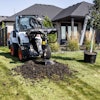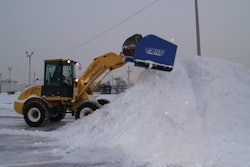
If every time it snowed you could plow out a dozen residential driveways and a half dozen local small businesses, you’d have a nice little snow-removal business on your hands. But the big money is in commercial property management.
Think you want to try and build a large snow-removal operation and get into this business? Phil Harwood is a CSP (certified snow professional) and former contractor. Today he’s a business coach with Pro-Motion Consulting. He offers his take on working with property managers as a snow and ice management contractor.
Pros of working with property managers
A single property manager typically manages multiple properties. What does that mean to the snow-removal contractor? There’s just one “client” to sell to and manage, but the result is often a much larger volume of work. Taking it one step further, as the property manager takes on new properties in either your existing market or new geographic markets, you have insider access to even more additional work.
Property managers are, generally speaking, educated and intelligent business-minded professionals. This is helpful because selling the value of your services is a complex matter. Also, relationships matter to most property managers. This is helpful because a property manager will be less likely to switch contractors and fire you if you’re doing a good job and they like working with you.
Cons of working with property managers
The commercial property management business is extremely competitive. All of the powerhouse snow and ice management contractors play here. They are experienced, well-trained and well-equipped.
Commercial property managers are dealing with budgets that change every year. Thus, snow-removal contractors are typically re-bidding every year. Pricing can get tight due to the hyper-competitive nature of this business.
Commercial property managers can also be rather demanding. They have been tasked with managing someone else’s property. They have their own set of pressures, budgets to manage and standards to adhere to.
In a sense, demanding can be good. A demanding client will reward only the best contractor that can meet their high standard, right? Well, there’s one problem. While we said earlier that property managers are generally intelligent and appreciative of relationships, some are not. Hopefully you can sniff those people out early and not waste too much time trying to win their loyalty.
Tips for winning work
When working in residential and even small commercial, you’ve probably had success “going through the front door,” likely contacting the owner directly. In commercial property management, "going through the back door" is more effective.
Networking is essential. Getting involving in trade associations is one tried-and-true way to network with property managers. Associations such as BOMA, IFMA, IREM, ISCS and PRSM are just a few to consider. In addition, look for local groups of business owners and property managers. Even your local Chamber of Commerce may be a great networking opportunity.
Another networking strategy is to partner with other service providers who may have relationships with the people you’re trying to reach. Think of waste-removal sales reps, HVAC contractors, commercial plumbers, electricians and window washers. These people may be great referral partners, especially if you have reciprocal relationships to refer them to.
Even if you establish a few new contacts in the property management business, focus on one at a time. You want to make sure you can do a great job and really build that relationship. That, in turn, will allow you to build your reputation.
Common mistakes contractors make
Invoicing mistakes. This has been cited by some as the No. 1 reason contractors are replaced
Don't negotiate terms. Commercial property managers expect some negotiation, and seasoned contractors negotiate terms to gain a more favorable position. The budget may not be negotiable, but often terms are. For example, changing payment terms from 60 days to 45 days is a significant improvement. You won’t win all negotiations but you will lose 100% of those never attempted.
Poor customer service. This one is self-explanatory.
Ask to get on bid lists. It might appear as though you only have a desire to "bid low," as opposed to selling your value and building a relationship. More importantly, the prospective client hasn't been fully qualified yet. "Why would a contractor want to spend money estimating and proposing work that hasn’t been qualified?" Harwood asks. Furthermore, "Why would a CPM hire a contractor whom they’ve never met and have no relationship with?"
Develop an attitude toward property managers. This is easy to do. But to be successful in this sandbox, you need to have thick skin and a big smile.
Not building relationships. This one is self-explanatory.
Avoid the price trap, build relationships and earn loyalty
Much like the landscaping, pavement and concrete industries, snow and ice management has become extra competitive over the past few years. Budget-strained property managers have naturally looked harder at price point. But you have to avoid the “it’s all about the price” trap.
It’s not easy for all contractors to do. You have to add value. You have to be different. You have to build relationships.
Harwood says that there's a misconception that property managers have no loyalty; price is all that matters. In his experience, this could not be further from the truth. Property managers are simply agents for the owner. As such, they have an obligation to get the best value. Contractors who understand the dynamics in play realize that the more value they can create, regardless of the price, the more loyal the property manager will be to them.
The value equation is simply this: Value equals benefits minus costs. As long as the benefits of your solutions exceed the total cost of obtaining these benefits, there is value creation. The contractor who creates the most value wins the work and keeps the relationship. Harwood says he has found most property managers to be fiercely loyal to their “go-to” contractors—those who create value for them.
"In my previous life as a contractor, we developed excellent relationships with property management firms by being proactive and responsive, available and attentive to their needs, and continually investing in relationships," Harwood relates. "We also were always looking for opportunities to go above and beyond.
“During a particularly brutal multi-day snow storm, the chief of police for the City of Detroit called in the middle of the night," Harwood continues. "I answered the phone, as I was dispatching, and quickly realized that this was an emergency. Despite the fact that we had no agreement with the City, we bailed them out by sending a fleet of iron down I-75 with a police escort. Luckily this occurred over the weekend, allowing us time to still clean up our commercial office sites by Monday morning. This experience was leveraged into a consulting contract to help write the City’s snow response plan, along with the awarding of a large section of the City’s plowing contract the next winter.”




![Doosan Bobcat Wacker Neuson Stack 2ec Js Pb V6e[1]](https://img.greenindustrypros.com/mindful/acbm/workspaces/default/uploads/2025/12/doosan-bobcat-wacker-neuson-stack2ecjspbv6e1.CPyyz8ubHn.png?auto=format%2Ccompress&bg=fff&fill-color=fff&fit=fill&h=100&q=70&w=100)







![Doosan Bobcat Wacker Neuson Stack 2ec Js Pb V6e[1]](https://img.greenindustrypros.com/mindful/acbm/workspaces/default/uploads/2025/12/doosan-bobcat-wacker-neuson-stack2ecjspbv6e1.CPyyz8ubHn.png?ar=16%3A9&auto=format%2Ccompress&bg=fff&fill-color=fff&fit=fill&h=135&q=70&w=240)

![Gravely Pro Turn Mach One My23 Dsc03139 Edit 1200x800 5b2df79[1]](https://img.greenindustrypros.com/mindful/acbm/workspaces/default/uploads/2025/10/gravely-pro-turn-mach-one-my23-dsc03139-edit-1200x800-5b2df791.BucBnDoN22.jpg?ar=16%3A9&auto=format%2Ccompress&fit=crop&h=135&q=70&w=240)


![Kubota Snow ah3 Sgv25ua[1]](https://img.greenindustrypros.com/mindful/acbm/workspaces/default/uploads/2025/10/kubota-snowah3sgv25ua1.bAUoUSziui.png?ar=16%3A9&auto=format%2Ccompress&bg=fff&fill-color=fff&fit=fill&h=135&q=70&w=240)


